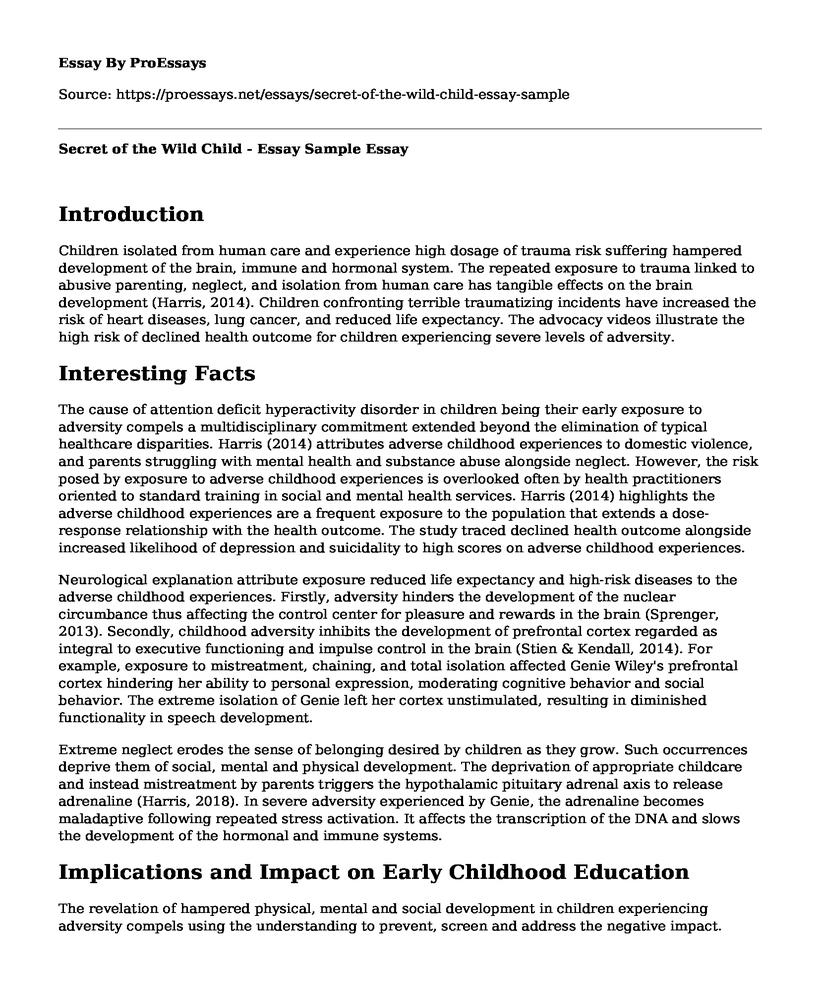Introduction
Children isolated from human care and experience high dosage of trauma risk suffering hampered development of the brain, immune and hormonal system. The repeated exposure to trauma linked to abusive parenting, neglect, and isolation from human care has tangible effects on the brain development (Harris, 2014). Children confronting terrible traumatizing incidents have increased the risk of heart diseases, lung cancer, and reduced life expectancy. The advocacy videos illustrate the high risk of declined health outcome for children experiencing severe levels of adversity.
Interesting Facts
The cause of attention deficit hyperactivity disorder in children being their early exposure to adversity compels a multidisciplinary commitment extended beyond the elimination of typical healthcare disparities. Harris (2014) attributes adverse childhood experiences to domestic violence, and parents struggling with mental health and substance abuse alongside neglect. However, the risk posed by exposure to adverse childhood experiences is overlooked often by health practitioners oriented to standard training in social and mental health services. Harris (2014) highlights the adverse childhood experiences are a frequent exposure to the population that extends a dose-response relationship with the health outcome. The study traced declined health outcome alongside increased likelihood of depression and suicidality to high scores on adverse childhood experiences.
Neurological explanation attribute exposure reduced life expectancy and high-risk diseases to the adverse childhood experiences. Firstly, adversity hinders the development of the nuclear circumbance thus affecting the control center for pleasure and rewards in the brain (Sprenger, 2013). Secondly, childhood adversity inhibits the development of prefrontal cortex regarded as integral to executive functioning and impulse control in the brain (Stien & Kendall, 2014). For example, exposure to mistreatment, chaining, and total isolation affected Genie Wiley's prefrontal cortex hindering her ability to personal expression, moderating cognitive behavior and social behavior. The extreme isolation of Genie left her cortex unstimulated, resulting in diminished functionality in speech development.
Extreme neglect erodes the sense of belonging desired by children as they grow. Such occurrences deprive them of social, mental and physical development. The deprivation of appropriate childcare and instead mistreatment by parents triggers the hypothalamic pituitary adrenal axis to release adrenaline (Harris, 2018). In severe adversity experienced by Genie, the adrenaline becomes maladaptive following repeated stress activation. It affects the transcription of the DNA and slows the development of the hormonal and immune systems.
Implications and Impact on Early Childhood Education
The revelation of hampered physical, mental and social development in children experiencing adversity compels using the understanding to prevent, screen and address the negative impact. Revealed by Dave Pelzer account of living with abusive, torture and starvation by the mother, stakeholders should prioritize rescuing children who exhibit attention deficit hyperactivity disorder in school (Pelzer, 2011). From this account, stakeholders in the early childhood education should initiate a multidisciplinary approach to prevent and heal the effect of adversity experiences. The stakeholders should commit to regular screening for adverse experiences and place children with positive symptoms of adversity under the multidisciplinary treatment plan (Harris, 2018). Like the foster parental care offered to Dave Pelzer, early childhood educators should conduct home visits and partner with healthcare practitioners for holistic interventions on nutrition and mental services.
Advocacy Change to Support Children and Families in Trauma
The knowledge of risk posed by severe adversity experiences in childhood compels initiating a movement that educates the society about the impact of toxic stress levels similar to preventing electrical outlets and poisoning. The situation compels a race to the multidisciplinary approach to offer tailored care and aggressive treatment to counter the exposure effects (Harris, 2018). Besides, the situation mandates awareness of adverse childhood experiences being a common public health challenge in today's society. It requires the commitment to advocate for a multidisciplinary initiative to offer holistic interventions to resolve the exposure to toxic childhood trauma.
Conclusion
Creating awareness offered by the Secret of the Wild film on Genie Wiley, reveals adverse experiences as a looming public health crisis. The ability of toxic childhood experiences hampering mental, social and physical development compels initiating an advocacy movement for holistic interventions tailored to counter the trauma effect. The adverse childhood experiences is a lifetime challenge affecting the entire population regardless of the social status and race. However, it is treatable through courage, commitment, and acceptance as a looming public health crisis through coordinated care.
References
Harris, N. B. (2014). How childhood trauma affects health across a lifetime. Retrieved September 24, 2018, from https://www.ted.com/talks/nadine_burke_harris_how_childhood_trauma_affects_health_across_a_lifetime#t-946791
Harris, N. B. (2018). The deepest well: Healing the lon-term effects of childhood adversity. Boston : Houghton Mifflin Harcourt.
Pelzer, D. (2011, May 04). Victims face criminals: Dave Pelzer on Larry King. Retrieved September 24, 2018, from https://www.youtube.com/watch?v=RnSntzvGteI&t=13s
Sprenger, M. (2013). The developing brain: Building language, reading, physical, social, and cognitive skills from birth to age eight. New York: Skyhorse Publishing.
Stien, P. T., & Kendall, J. C. (2014). Psychological trauma and the developing brain: Neurologically based interventions for troubled children. New York : Taylor & Francis.
Cite this page
Secret of the Wild Child - Essay Sample. (2022, Aug 15). Retrieved from https://proessays.net/essays/secret-of-the-wild-child-essay-sample
If you are the original author of this essay and no longer wish to have it published on the ProEssays website, please click below to request its removal:
- Essay on College of Massage Therapists of British Columbia Programs
- Jobs or Occupations That My Family Members and I Have Held. Essay Example.
- Nursing Professional Statement Example
- Financial Analyst Application Paper Example
- The Freedom to Be Me Essay Example
- Essay on Brown and Levinson's Framework: Advancing Human Speech & Communication
- Teaching English in German Secondary Schools: Didactic Methods & Challenges - Essay Sample







